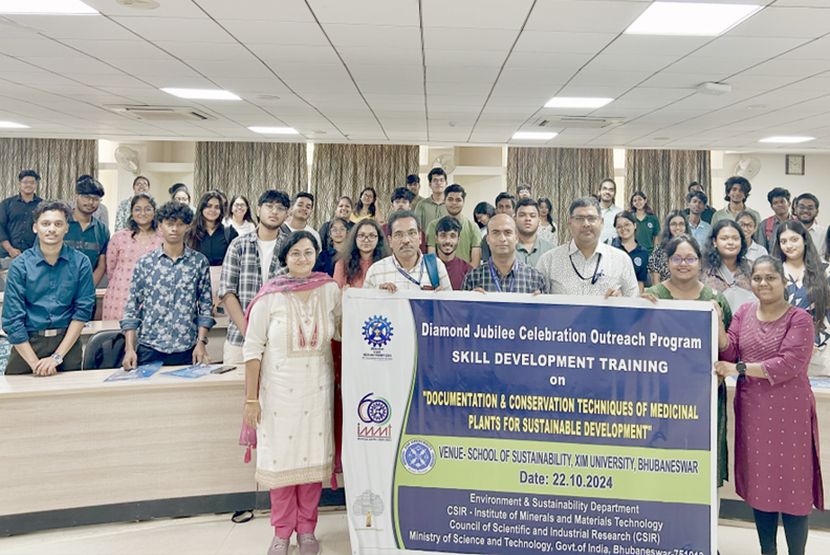“Each medicinal plant holds a unique key to understanding both our biology and the natural world. Preserving these plants is essential not only for our health but for the survival of future generations.” – Mark Plotkin (Ethnobotanist)
The School of Sustainability, XIM University, conducted a training session organized by the CSIR-Institute of Minerals and Materials Technology (IMMT), Bhubaneswar, under the Ministry of Science and Technology, Govt. of India on the theme “Documentation and Conservation Techniques of Medicinal Plants for Sustainable Development” on 22nd October, 2024. The event was hosted by third year BSc. SD and EVS students Siddhant Das and Rhea Sharma with a brief introduction about the session followed by felicitation of the speakers by the esteemed faculty. On behalf of the School of Sustainability, a formal welcome address was given by prof. Aradhana Basu, convener of the program. She expressed gratitude to the scientists of CSIR- IMMT for organizing the skill development training program at XIM University. She gave an insight on the importance of medicinal plants as anti-bacterial and anti-viral alternatives. She informed the audience regarding the herbarium which is having more than 15,000 different species of medicinal plants situated in the Environment and Sustainability department, CSIR- IMMT. She also shared the good news that School of Sustainability would have small medicinal plant garden near the butterfly garden in the campus.
The prominent scientists from CSIR- IMMT, Dr. Nabin Kumar Dhal, Dr. Manish Kumar and Dr. T Pavan Kumar collectively briefed us on the importance of Medicinal Plants and its way of conservation techniques to promote sustainability with their short introductory speeches. Dr. Dhal started with the ways to make the campus more green in an useful and better way, the need for checking plastic pollution in university campus, following which Dr. Pavan Kumar talked about the importance of documentation and the cases India fought against a patent issued by US for the medicinal uses of Haldi and Neem. Moving on to Dr. Dhal stated the importance of practicing naturopathy relating to Darwin’s theory i.e., “Survival of the Fittest”.
Dr. Dhal gave a technical presentation on “Inventing the Future for Global Peace and Sustainable Development”, enlightening us with the importance of Ayush Kwath- Tulsi, Munalika, Dalchini, Golden Doodh (turmeric milk) boosting immunity and prevent infection. Curcuma/Haldi plant can be identified by the smell of its leaves and its long length in comparison of Tulsi leaves. The increase in Dengue- a mosquito borne disease causing the decrease in the blood platelet count can be increased from at least 68000 to 200000 by consuming Papaya leaf juice/ Carica papaya. Dr. Dhal spoke about the diversity of species in a tree and the beginning of medicinal plants from Indian mythology.
Moving on to the hands-on training and field component, Dr. Dhal demonstrated the ways to conserve a plant by pressing, drying, poisoning, stitching and labelling, identification of the plant on the basis of its habitat, morphological features and utilitarian category including taste, odour, touch. There was a brief introduction to the scientific names of common known plants like neem and devdaru and its benefits. He concluded his presentation by a small workshop involvement to narrate a picture in different perspectives. The PhD scholars from CSIR- IMMT gave a short presentation on the herbal solutions for diabetes, stating its unusual causes and symptoms treating it with synthetic herbal medicines and its preparation.
Post the Lunch, everyone assembled near the butterfly garden for the plantation drive of a medicinal plant garden where the students as well as the faculty showed their involvement by planting saplings. There was a short practical session provided by Dr. Nabin Dhal and Dr. Manish Kumar about the preservation and the criteria for the collection of plants.
The students of both BSc. Sustainable Development and Environmental Science showed their active participation throughout the whole session, learning important information about the need of medicinal plants and its uses to help promote sustainability.
Conclusion
The session emphasized the significance of medicinal plants for sustainability, with insights from Dr. Nabin Kumar Dhal, Dr. T. Pavan Kumar, and Dr. Manish Kumar. Key topics included campus greening, plastic pollution control, and the importance of documenting indigenous knowledge to safeguard it from misuse. The event featured practical demonstrations on plant conservation and a plantation drive, fostering hands-on learning. Students actively engaged, gaining valuable knowledge about herbal solutions, plant preservation techniques, and sustainable practices. The initiative reinforced the role of medicinal plants in promoting health, environmental stewardship, and sustainable development.





